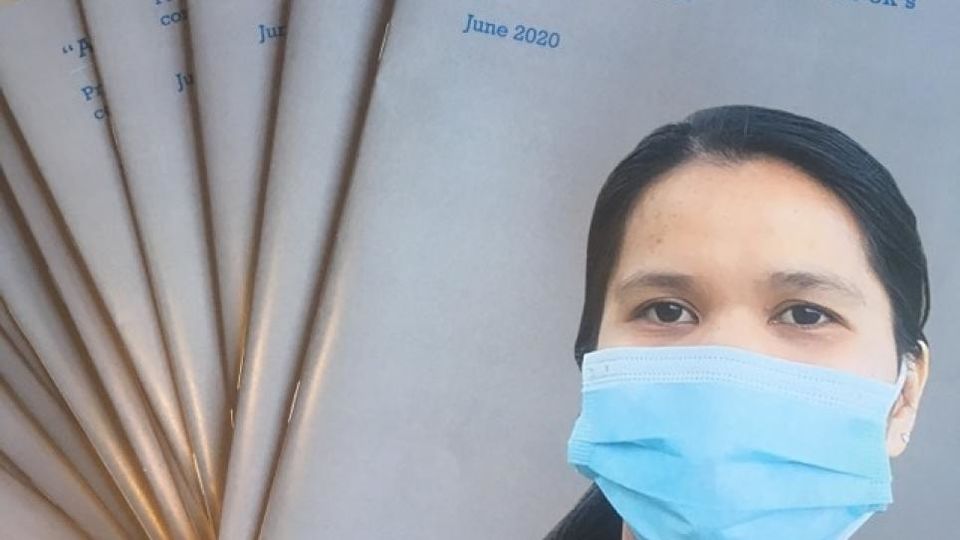Dr Ella Parry-Davies Publishes “A Chance to Feel Safe" Report into the effects of COVID-19

Dr Ella Parry-Davies, Central’s British Academy Postdoctoral Fellow and a BBC/ AHRC New Generation Thinker, has partnered with the Kanlungan Filipino Consortium and the Refugee and Asylum Seeker Participatory Action Research charity (RAPAR) to release a new report documenting the impact of the COVID-19 pandemic on Filipino migrants in the UK.
A Chance to Feel Safe: Precarious Filipino Migrants amid the UK’s Coronavirus Outbreak was published on 24 June 2020 and surveyed 79 Filipino migrants, the majority living without legal status in the UK, about the impact of the global pandemic on their lives.
Over half of those surveyed had lost all of their work and income because of the pandemic, and 1 in 5 were homeless or staying temporarily with friends. The report concludes that hostile environment policies “constitute a danger to public health by presenting people with the impossible choice of going to work and risking their health and the health of all those they are in contact with, or otherwise falling into destitution.” Its key recommendations are:
- Regularise all undocumented migrants
- End NHS charges and data sharing
- End hostile environment policies putting the public in danger
- Raise awareness of migrants’ rights
The report reveals that many undocumented migrants are afraid to seek healthcare for fear of being deported. Of 13 who had COVID-19 symptoms, only 1 sought medical care. Others said they would not seek NHS treatment if they had symptoms in future because they are afraid of being charged prohibitive costs or having their information passed onto the Home Office.
For those living under the radar, the government’s furlough scheme and other financial safety nets are effectively meaningless. Undocumented migrants are faced with the impossible choice of living and working in unsafe conditions, or falling into destitution.
9 in 10 of those surveyed made a living caring for elderly and vulnerable adults, looking after children, and cleaning. While the nation is celebrating keyworkers and care workers, this shadow workforce has remained invisible.
One participant said, “There’s no certainty now. I couldn’t even tell you it’s going to be ok. Before, even though it’s hard - all the anger, all the resentment to people who’ve done this to you - I was a little bit hopeful. There was a little glimmer of hope. But the way I see it, it’s been a long time and nothing changes. It’s like you’re just floating from day to day.”
Public Health England has admitted that COVID-19 has disproportionately affected BAME communities. But the participants of this research have been almost entirely ignored, and invisible in national statistics.
This work follows on from Dr Ella Parry-Davies’ previous research into transnational migration and, most recently, the collaborative creation (with Filipina domestic and care workers living in the UK and Lebanon) of a series of soundwalks about migration, domestic labour and the lived experiences of individuals who work ”behind closed doors”.
Of the Report, Dr Ella Parry-Davies said:
“This report reveals the deadly effects of “hostile environment” immigration policies amidst a global pandemic. These policies reach into the everyday lives of migrants, affecting their jobs, housing and health. But it’s important to remember that what the report exposes is not new: global inequities and vicious immigration policy existed before the COVID-19 pandemic, and we need to take action now to ensure their lethal effects are stopped.
The report contributes evidence to urgent debates about the disproportionate effects of the pandemic and lockdown on BAME communities and socially excluded groups. And it takes a global perspective, since 80% of those surveyed are supporting loved ones in the Philippines, which has also been hit hard by the pandemic.”
Susan Cueva, Trustee of the Kanlungan Filipino Consortium said:
“Many of the undocumented Filipinos in the UK are trained nurses, health care workers, teachers, or childminders. Their only wish is to contribute their skills to British society without being exploited and to improve the lives and futures of their families. The covid19 pandemic made these people even more destitute. It is not a crime to hope for a better life.”
Read more about the report by visiting the Kanlungan Filipino Consortium’s website, in The Guardian, the Independent and the BBC. Dr Ella Parry-Davies also appeared on the BBC’s Art & Ideas programme Free Thinking, which is available to listen or download until June 2021.
Visit the Home Makers website to listen to soundwalks created by Dr Ella Parry-Davies in collaboration with migrant domestic and care workers.
